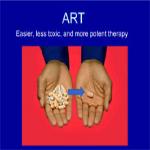15 April 2010
Over the years, there's been debate over when to start HIV-positive patients on anti-retroviral drugs, or ARVs. At first the standard practice was to wait until a person's immune system had nearly collapsed. But a growing body of research shows there may be many benefits to starting treatment much earlier.
Measuring the number of CD4 immune cells is a major determining factor on when to begin drug treatment. It was the norm to give ARVs to people who either had full-blown AIDS or had CD4 counts below 200.
Now it's generally accepted that anti-retrovirals should be given when the count drops below 350. But there's debate over whether to start treatment even earlier than that.

OPMAN XVIII
Dr. Roy Gulick, Weill-Cornell Medical CenterThe subject was discussed at the recent OPMAN XVIII, the Optimal Management of HIV Disease Conference.
Dr. Roy Gulick, professor of medicine at the Weill-Cornell Medical Center in New York City, says, "It's ironic that 23 years now into anti-retroviral therapy we are still asking a very basic question. And that is, when should we start?"
Pros and cons
Gulick outlines a few reasons for starting anti-retroviral treatment early.
"We know that our treatment decreases viral load levels and thus the emergence of (drug) resistance and also increases CD4 cell counts and general immune function. We have published data to show that our best regimens can suppress viral load levels for up to seven years or longer," he says
What's more, he says, "Treatment likely reduces transmission in the community. That is, treatment can be prevention."
Starting earlier may also be more cost effective.
Some of the reasons for delaying treatment have included the inconvenience and toxicity of anti-retrovirals and their long-term side effects.
"On balance, up until recently, we have elected to wait to start. But there is a lot of data, newer data, to suggest that the balance of this question is likely shifting," he says.
There had been general agreement that ARV treatment should be started for anyone with AIDS, symptomatic HIV disease or CD4 counts less than 200.
But there's now agreement on a second group with a higher count.
"That is asymptomatic with CD4s between 200 and 350. The developed country guidelines all changed to a firm yes in 2008. And the newest guidelines to now suggest this are the WHO (World Health Organization) '09 guidelines, which now say, yes, we should be treating anyone with HIV disease, regardless of symptoms, with a CD4 (count) less than 350," he says.
A study in Haiti helped persuade the World Health Organization to recommend starting treatment earlier. Fewer deaths and infections were found in those who received ARVs sooner. Besides a drop in mortality, earlier treatment resulted in fewer tuberculosis cases among patients.
"This was the data that caught the eye of the WHO and really the world and said that we should be starting earlier throughout the world," he says.
Gulick says the shift to earlier treatment is also due, in part, to "easier, less toxic and more potent therapy."
He says, "So we go from handfuls of 20 plus pills taken three times daily to as few as one pill once a day."

Dr. Roy Gulick
There are also the findings of many cohort studies to support earlier treatment. The findings are based on thousands of HIV patients, whose progress was followed in clinics.
In 2002, in one study, no difference was seen in those receiving treatment when their CD4 counts were between 200 and 350 and those who started treatment when their counts were over 350. At least that was the case after comparing the two groups over a three-year period.
"Although there's no difference at three years," he says, "at five years, this now reaches statistical significance. So, there was a benefit to starting earlier in this cohort study. And it took over three years, more like five years, to convincingly show the clinical benefit here."
Proof enough?
The professor of medicine asks if the results appear good for those receiving treatment at this stage, why not start even earlier? In other words, a CD4 count above 350. Some cohort studies seem to support this, but Gulick says those studies are not always enough to go on.
"Well, what's the problem with all the data I've shown you so far? And that is it's not randomized clinical trial data. These are cohort patients. That is, general patients followed in clinics," he says.
And these patients may be different.
"It's safe to say that patients who elect to start ART (anti-retroviral therapy) with high CD4s may not be the same as patients who defer ART with the same high CD4s," he says.
Those who choose to start treatment sooner may have better health habits.
"They may use seatbelts more. They may exercise more. There may be other confounding reasons why they have general better health than the group who elects to defer. So we have to take all this cohort data somewhat with a grain of salt," Gulick says.
And some cohort studies found starting treatment at a much higher 450 to 550 CD4 count showed no significant benefits.
To try to settle the issue, a formal clinical study – the Start study – is now underway. It's enrolled patients with CD4 counts higher than 500. The study could finally determine whether it's more beneficial to start treatment immediately or wait until CD4s drop below 350, the current standard. However, the results may not be known for six years.
Some say the there's enough data from the cohort studies to not wait for the Start study results.